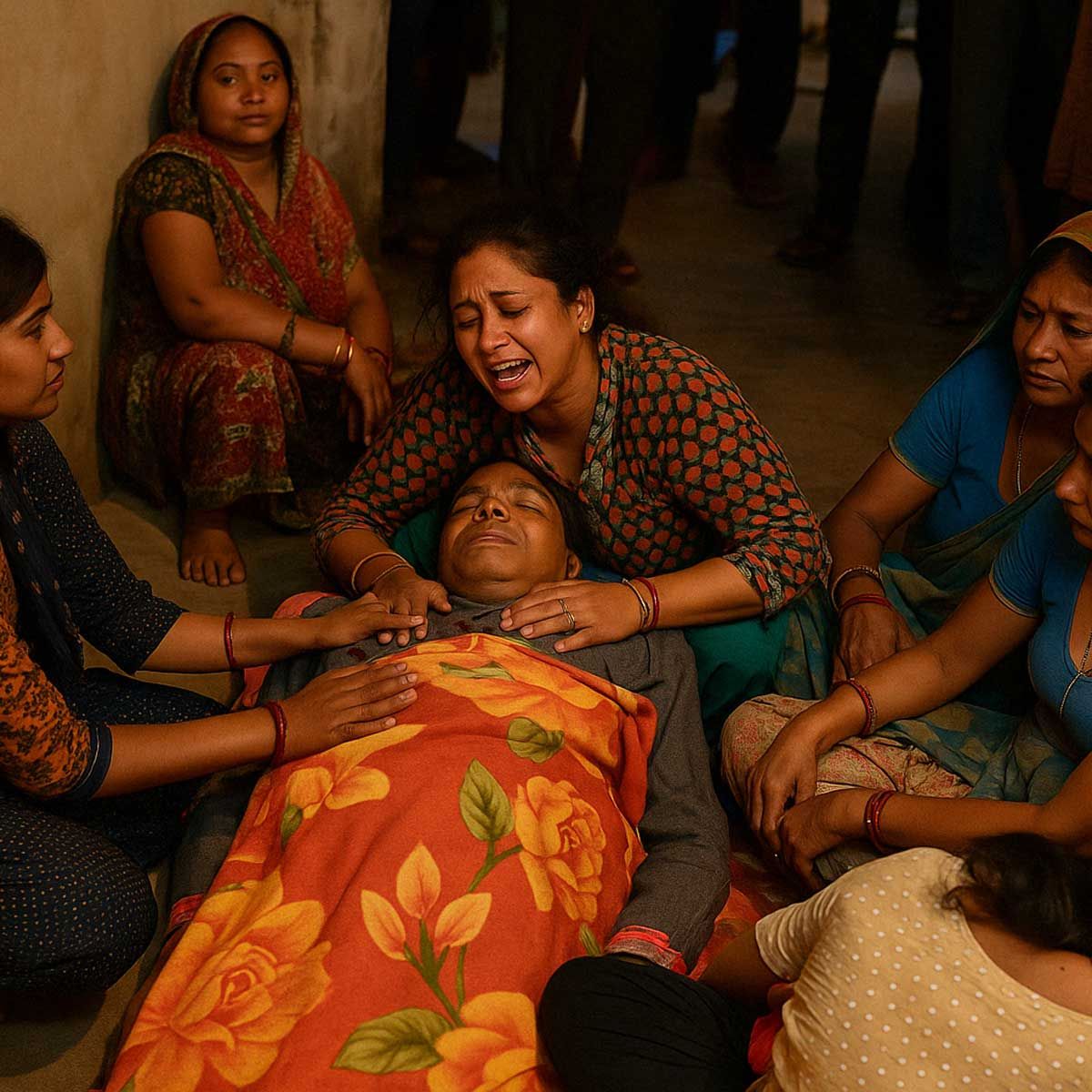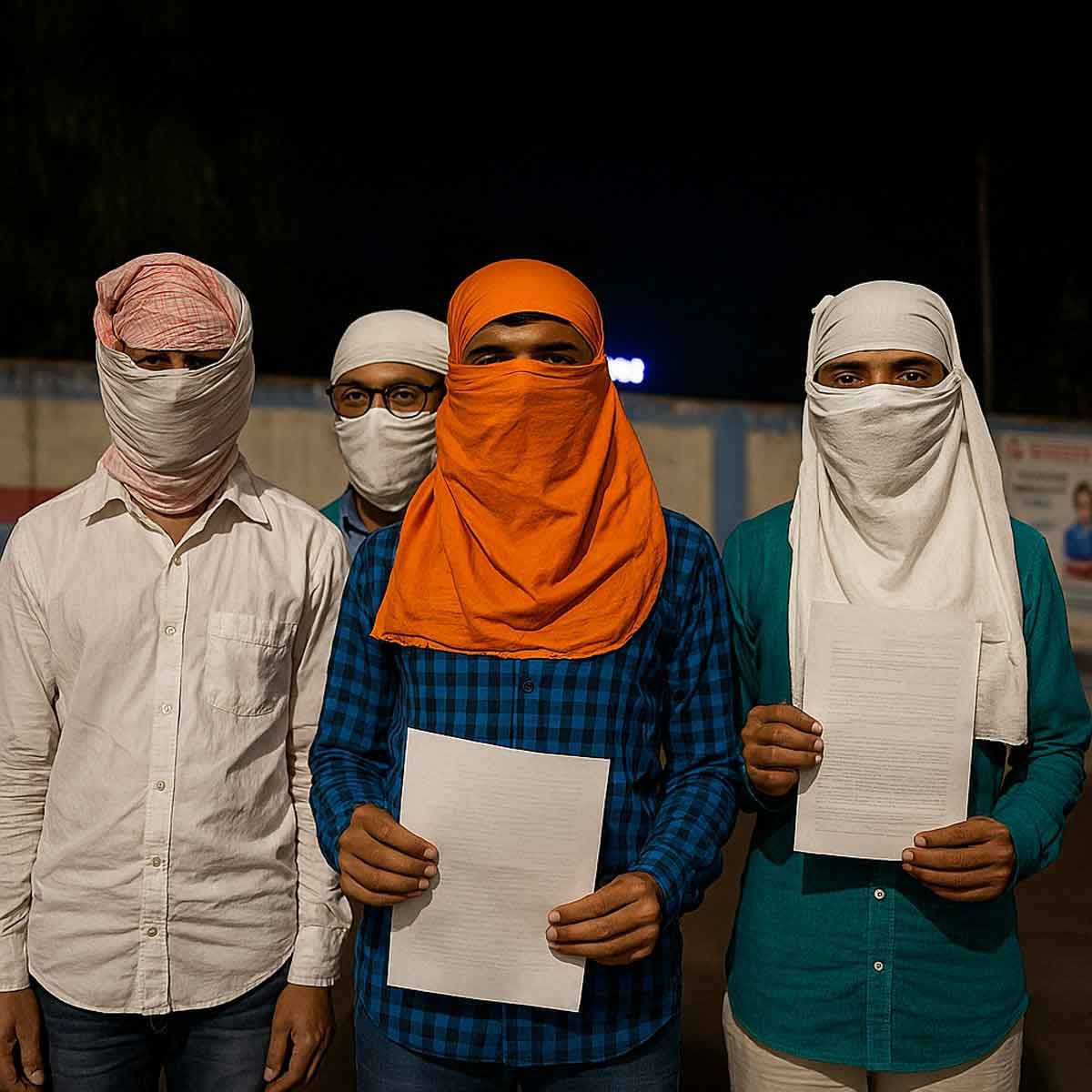More Coverage
Twitter Coverage
Satyaagrah
Written on
Satyaagrah
Written on
Satyaagrah
Written on
Satyaagrah
Written on
Satyaagrah
Written on
JOIN SATYAAGRAH SOCIAL MEDIA
"हवाहवाई": In an unprecedented move, aviation authorities levy a striking fine on IndiGo ₹1.2 crore & Mumbai Airport 90 lakhs for passenger neglect, the incident highlighting a failure in proactive measures, sets a new precedent in aviation accountability

In a significant move reflecting the stringent enforcement of aviation safety norms in India, the Bureau of Civil Aviation Safety (BCAS) has levied a substantial fine on both IndiGo and the Chhatrapati Shivaji Maharaj International Airport (CSMI Airport) in Mumbai. The fines, amounting to Rs 1.2 crore for IndiGo and Rs 60 lakh for CSMI Airport, were imposed following an incident that caught public attention through social media. A video showing passengers eating on the tarmac at the Mumbai Airport had gone viral, sparking widespread concern over safety protocols at the airport.
|
Additionally, the Directorate General of Civil Aviation (DGCA), another key regulatory body in Indian aviation, has imposed a fine of Rs 30 lakhs on the Mumbai Airport, bringing the total penalty to Rs 90 lakhs. This action by the DGCA further underscores the gravity of the situation and the authorities' commitment to upholding safety standards.
The imposition of these fines stems from an incident that occurred on January 15th. Passengers of an IndiGo flight, after enduring a delay exceeding 12 hours, were seen sitting on the tarmac of the airport, having dinner. This unusual and alarming scenario not only highlighted the discomfort and inconvenience faced by the passengers but also raised serious questions about the adherence to safety protocols at one of India's busiest airports.
The regulatory authorities' decision to impose fines followed the receipt of an unsatisfactory response from the CSMI Airport to a show cause notice issued earlier. The airport's failure to comply with the prescribed safety requirements has been noted as a key reason for this punitive action. The incident and the subsequent fines imposed serve as a reminder of the importance of maintaining strict safety and operational protocols in aviation, especially in high-traffic airports.
In a related development, two other airlines, Air India and SpiceJet, were also penalized for violating norms. While the details of these violations were not immediately specified, these penalties indicate a broader enforcement action by aviation authorities to ensure compliance with safety and operational standards across the sector.
|
Why Was Airport Fined?
In a response to a recent incident that raised eyebrows across the nation, the Bureau of Civil Aviation Safety (BCAS) and the Directorate General of Civil Aviation (DGCA) have imposed hefty fines on IndiGo and Mumbai Airport. The total fine imposed on Mumbai Airport by both authorities amounts to Rs 90 lakhs, with BCAS imposing Rs 60 lakhs and DGCA adding Rs 30 lakhs. Additionally, IndiGo faces a penalty of Rs 1.2 Crore. These fines came into effect following an incident that gained significant public attention through social media—a video showing passengers sitting on the airport's tarmac, eating their meals.
The Ministry of Civil Aviation had issued show cause notices to both IndiGo and Mumbai Airport on Wednesday, immediately after the video went viral. The notice cautioned, "If replies are not received in the given time, then enforcement action, including financial penalty, will be initiated." The responses to this notice, unfortunately, were found to be unsatisfactory, prompting the authorities to take stringent action in the form of financial penalties.
The Ministry held both Mumbai Airport and IndiGo accountable for the incident. Their primary accusation was that both entities failed to be "proactive in anticipating the situation and making the appropriate facilitation arrangements for passengers at the airport." This lack of foresight and adequate preparation evidently led to the scenario where passengers were compelled to sit on the tarmac and have their meals, a situation far from the expected standards of airport operations and passenger handling.
Further compounding the issue was the allocation of a remote bay, C-33, for the aircraft, instead of a Contact Stand. Contact Stands are essential for ensuring smooth transit of passengers directly to and from the aircraft via an allocated boarding gate. The use of a remote stand not only inconvenienced passengers but also deprived them of access to basic amenities such as restrooms and refreshments, which are readily available at the terminal. This decision contributed significantly to the passengers' woes, adding another layer to the mismanagement that occurred on that day.
Why Was IndiGo Fined?
The Ministry of Civil Aviation has taken a firm stance against IndiGo, leading to a substantial fine, due to the airline's handling of a particular flight operation that compromised passenger convenience, security norms, and operational protocols. In the detailed show cause notice served to IndiGo, the authorities highlighted specific lapses in the airline's procedure. "Indigo allowed disembarkation of passengers from flight 6E 2195 onto the apron and then boarded them on to flight 6E 2091 on 15.01.2024 at Mumbai airport, without following the procedure of security screening, which violates the above-mentioned orders. Further, the incident was not reported to BCAS (Bureau of Civil Aviation Security) by the aircraft operator, which is attributed to a violation of Rule 51 of the Aircraft (Security) Rules, 2023.”
This statement from the Ministry points out two major violations by IndiGo. Firstly, the failure to conduct proper security screening during the transfer of passengers between flights, a crucial step in ensuring the safety and security of airline operations. Secondly, the airline did not report this significant lapse to the BCAS, a mandatory requirement under aviation security rules. These oversights are serious breaches of established aviation protocols and have led to the significant penalty imposed on the airline.
IndiGo had previously acknowledged the gravity of the incident by initiating an internal inquiry. However, following the imposition of the hefty fine, the airline's response or stance on the matter remains to be seen. The airline, in a statement, noted a communication gap with the Airport Security Group (ASG) of Mumbai, indicating that the ASG was not adequately informed about the unfolding situation.
Adding to the airline's troubles, this incident closely followed another controversial event involving IndiGo. A video depicting a cabin crew member being assaulted by a passenger frustrated by a delay in take-off had also gone viral, further spotlighting the airline's operational challenges.
Now, both the DGCA and BCAS have taken decisive action against Mumbai Airport and IndiGo, penalizing them for their roles in this series of events. These fines serve not only as punitive measures but also as reminders of the importance of adhering to security protocols, operational efficiency, and maintaining high standards of passenger service in the aviation industry. They underline the need for airlines and airport authorities to ensure that their operations are carried out with the utmost consideration for passenger convenience, safety, and security.
Not Only IndiGo, but SpiceJet and Air India Were Also Fined
The Directorate General of Civil Aviation (DGCA), in its recent enforcement actions, has not limited its focus to IndiGo alone. SpiceJet and Air India, two other major players in the Indian aviation sector, have also come under scrutiny and consequent penalization. Both airlines have been fined Rs 30 lakh each, a decision stemming from incidents related to operational challenges during adverse weather conditions.
The penalties imposed on SpiceJet and Air India are specifically linked to delays in their flights caused by fog in Delhi. Foggy conditions, particularly in the winter months, are a common and challenging aspect of flying in North India. The DGCA's decision to fine these airlines is based on their lack of preparedness to handle such weather conditions, a critical requirement for safe and timely operations.
Central to this issue is the allegation that both SpiceJet and Air India failed to deploy pilots trained in CAT III operations during foggy days. CAT III, or Category III, refers to a type of instrument landing system (ILS) that allows pilots to land in extremely low visibility conditions, such as dense fog. Pilots certified in CAT III operations are specially trained to navigate these challenging conditions, ensuring passenger safety and minimizing delays caused by weather.
The fines levied on SpiceJet and Air India highlight the importance of having CAT III trained pilots on duty, especially during the winter season when fog is a recurrent issue in many parts of India. The DGCA's action underscores the need for airlines to be fully prepared for all weather conditions and to prioritize passenger safety and punctuality in their operations. This enforcement also serves as a reminder to all airlines operating in India to maintain the highest standards of safety and preparedness, particularly in adverse weather conditions, to avoid operational disruptions and ensure passenger safety.
 |
 Support Us
Support Us
Satyagraha was born from the heart of our land, with an undying aim to unveil the true essence of Bharat. It seeks to illuminate the hidden tales of our valiant freedom fighters and the rich chronicles that haven't yet sung their complete melody in the mainstream.
While platforms like NDTV and 'The Wire' effortlessly garner funds under the banner of safeguarding democracy, we at Satyagraha walk a different path. Our strength and resonance come from you. In this journey to weave a stronger Bharat, every little contribution amplifies our voice. Let's come together, contribute as you can, and champion the true spirit of our nation.
 |  |  |
| ICICI Bank of Satyaagrah | Razorpay Bank of Satyaagrah | PayPal Bank of Satyaagrah - For International Payments |
If all above doesn't work, then try the LINK below:
Please share the article on other platforms
DISCLAIMER: The author is solely responsible for the views expressed in this article. The author carries the responsibility for citing and/or licensing of images utilized within the text. The website also frequently uses non-commercial images for representational purposes only in line with the article. We are not responsible for the authenticity of such images. If some images have a copyright issue, we request the person/entity to contact us at satyaagrahindia@gmail.com and we will take the necessary actions to resolve the issue.
Related Articles
- Chinese propaganda campaign video is busted by Indian Army, shares pictures of Indian Jawans unfurling Tricolour at Galwan Valley
- ‘Will they give livelihood 100 million farmers’: Amul MD responds to PETA India for asking them to use ‘vegan milk’ after losing a case to Amul
- With Lord Mountbatten & Edwina's 'bed-hopping' marriage - gay brothels and affair with PM, British historian Andrew Lownie reveals it all
- Add Vedas and review freedom fighter's portrayal in School textbooks: Parliamentary Committee on Education
- Haryana: Man burnt alive to make him ‘martyr’ against farm laws, villagers demand security from ‘farmers’ at Tikri border
- IMA continues to bully Baba Ramdev, now sues him for Rs 1,000 crore over his statements on Allopathic medicine
- Elderly woman gang-raped in front of grandson, minor Dalit girl gang-raped and left to die in jungle: WB horror stories emerge
- “Covid-19 virus is from China and it was intentionally leaked by China’s CCP” says Chinese virologist
- To protest against street Namaz, politicians and Mayor of a suburb sang the national anthem: France
- After two lynching cases in Punjab over sacrilege charges many theories sprouted like Political conspiracy, ISI-Khalistan, caste clashes and others
- Twitter says it removed verified badge from Vice President Venkaiah Naidu’s account due to ‘inactivity’: Here is why their argument is flawed
- India’s first Chief of Defence Staff General Bipin Rawat dies in helicopter crash: All you need to know
- Sensational revelation, Pakistan based Islamic organisation Dawat-e-Islami has huge support in Ahmedabad and gets money from over 2000 donation boxes to brainwash Muslim youth and inspire terror activities
- CM Basavaraj Bommai announces that Karnataka govt is going to bring the bill to free temples from govt control: A ray of Hope for the rise of Hindutva
- Kerala High Court slams state govt’s over 80% minority scholarship quota for Muslims, says legally not sustainable: Details




























